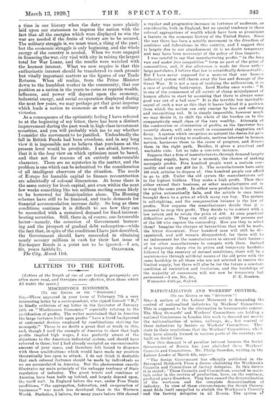LETTERS TO THE EDITOR.
getters of the length of one of our leading paragraphs are often more read, and therefore more effective, than those which fill treble the space.] MISCHIEVOUS ECONOMICS.
[TO THE EDITOR OF THE " SPECTATOR.)
Sia,—Tfiere appeared in your issue of February 7th a very interesting letter by a correspondent, who signed himself " B.," in kindly criticism of my letter in the Spectator of January 24th on "Mischievous Economics" especially relating to the justification of profits. The writer maintained that in America the large fortunes built upon profits " have a lurid background of anti-social devices employed by combinations striving for monopoly." There is no doubt a great deal of truth in this, and, though I used the example of America to show that high profits implied high wages, I was perfectly aware of the objections to the American industrial system, and should have referred to them; but I had already occupied an unconscionable amount of your space, and therefore felt bound to dispense with those qualifications which would have made my position theoretically less open to attack. I do not think it desirable that such colossal fortunes should be made by individuals as we see accumulated in America. But the phenomenon exactly illustrates my main principle of the unhappy tendency of State regulation of industry. The great trusts and combines of America have been built up behind, and largely depend upon, the tariff wall. In England before the war, under Free Trade conditions, " the aggregation, federation, and co-operation of businesses" was much less developed than in the Western World. Statistics, I believe, for many years before 1914 showed a regular and progressive increase in fortunes of moderate, or considerable, bulk in England, but no special tendency to those colossal aggregations of wealth which have been so prominent a feature in the economic history of the United States. Since the war there has been a notable movement in the direction of combines and federations in this country, and I suggest this is largely due to our abandonment (it is no doubt temporary and may have been necessary) of the policy of free imports.
I was careful to say that manufacturing profits " in the long run and under free competition" form no part of the price of commodities, and, if due allowance is made for these rather large postulates, I believe that law is scientifically demonstrable. But I have never supposed for a moment that any humen industrial system will charm away the loss and damage of the Great War. It is not a case of realizing the millennium, it is a case of avoiding bankruptcy. Lord Morley once wrote: "It is one of the commonest of all secrets of cheap misjudgment of human affairs to start by assuming that there is always some good way out of a bad case." It is the terrible but inevitable sequel of such a war as this that it leaves behind it a position from which the nation can only emerge by loss and suffering and unremitting toil. It is simply impossible, however much we may desire it, to shift the whole of the burden on to the comparatively small class of the very wealthy. Attempts at the confiscation or elimination of profits, as the Spectator has recently shown, will only result in commercial stagnation and decay. A system which recognizes as natural the desire for gain uses, instead of trying to eradicate, motives inherent in human nature, harnesses them to the cause of progress, and directs them in the right path. Besides, it gives a practical and workable rule. Let us take a concrete instance.
Suppose that a firm of manufacturers, through demand largely exceeding supply, have, for a moment, the chance of making monopoly profits. Five hundred people want a certain com- modity and can pay £10 for it. The manufacturers have only 100 such articles to dispose of. One hundred people can afford to go to £20. Under the old system the manufacturers sell to the highest bidders. They make a high profit. Then they either extend their business, or other manufacturers cut in to reap the same profit. In either case production is increased, the price automatically falls, and the article is once more brought down to a price at which many can buy. The system is self-righting, and the compensation balance is the law of profits. Now suppose the manufacturers decide that jt is immoral to reap this profit. They decide to be content with a low return and to retain the price at £10. At once practical difficulties arise. They can still only satisfy 100 persons out of the 500 who require the commodity. How are they to select theme Imagine the charges of favouritism that will be made, the bitter discontent. Four hundred men will still be dis- appointed, and will remain disappointed, for there will be no inducement for the manufacturers to extend their business or for other manufacturers to compete with them. Instead of a temporary sharp rise in prices and temporary hardship followed by the recovery of normal conditions, there will be a maintenance through artificial means of the old price with the same hardship to all those who are not selected to receive the limited supply, but there will also be for the future a constant condition of restriction and limitation, and the hardships of the majority of consumers will not now be temporary but










































 Previous page
Previous page